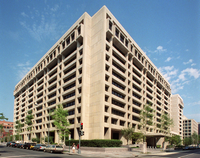Since 1944, America's position within the International Monetary Fund has given it tremendous influence over national and international financial markets. Increasingly, however, this influence has been met with resistance in some parts of the world, with America's relative economic decline causing some to question its dominant role within the Fund. But the U.S. has been largely unwilling to relinquish its privileged position, or to dramatically change its stance on the benefits of unfettered markets. As a result, despite a recent resurgence in the face of the global financial crisis, the IMF is today facing a serious challenge to its status as the world's lender of last resort, threatening to weaken even further America's global financial preeminence. The challenge comes from two fronts: East Asia and Latin America. In Asia, both the U.S. and the IMF have taken a credibility hit since the 1997 crisis, when recipient countries were angered by the austere conditions attached to emergency loans. Though the U.S. successfully blocked Japan's Asian Monetary Fund (AMF) proposal then, the region has continued on a steady path toward financial integration and self-sufficiency.
Towards a Post-Bretton Woods Global Financial Architecture

